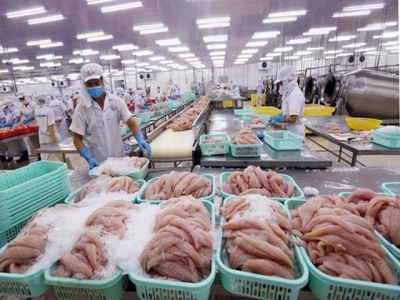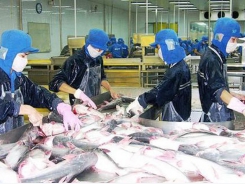Coronavirus outbreak to hit Vietnams pangasius, shrimp exports in short-term

The spread of the deadly coronavirus is drawing concern from fisheries authorities and seafood exporters in Vietnam as it begins to cause delays in the country’s trading with China.
However, Vietnamese seafood companies and executives interviewed by SeafoodSource said they are still projecting the impact of the outbreak will not hinder trade for long.
Seafood exports from Vietnam to China will face headwinds in the first quarter of this year, as many importers in China have notified exporters in Vietnam that they are unable to receive goods before 9 February due to restrictions on transportation in China, according to a statement from Navico, one of Vietnam’s top pangasius producers.
“Exports of pangasius to China are likely to slow down in early 2020 due to the impacts of the coronavirus outbreak,” Navico said in a 3 February statement.
According to Navico, Vietnam exported pangasius worth USD 728.6 million (EUR 656.5 million) to China (including Hong Kong) last year, up 37 percent from 2018. Navico’s sales to China (including Hong Kong) were USD 45.5 million (EUR 41 million) in 2019, soaring 57 percent year-on-year, making China the biggest buyer of the company’s pangasius.
The coronavirus epidemic could actually turn into an opportunity for seafood to gain greater market share in China, according to Navico. Once the virus is brought under control, demand for pangasius could rise sharply, as it has a reputation for being disease-free and is priced reasonably. Additionally, it is plentiful, which will be an important factor following the catastrophic impact of swine flu and a growing outbreak of bird flu in China’s Hunan Province, which have caused shortfalls in pork and chicken. Navico said it is monitoring the Chinese market closely and can increase its shipments to China with less than one week’s notice.
However, the immediate impacts of the coronavirus outbreak are being seen in the stock prices of Vietnam’s publicly traded seafood firms. The VN-Index fell for its third consecutive session on 3 February, with the index down 0.91 percent to 928.14 points, its lowest mark since 11 February last year, due to the coronavirus contagion.
Top pangasius exporters saw their shares plunge, including Vinh Hoan, down 6.88 percent to VND 32,500 (USD 1.40, EUR 1.26) per share; Navico, down 6.99 percent to VND 17,950 (USD 0.77, EUR 0.70) per share; and I.D.I., down 6.86 percent to VND 4,210 (USD 0.18, EUR 0.16) per share.
Shrimp exporters’ shares also fell, with Minh Phu falling 1.45 percent to VND 20,400 (USD 0.88, EUR 0.79) and Fimex losing 2.75 percent to VND 24,800 (USD 1.00, EUR 0.96) per share.
Fimex (Sao Ta) Chairman Ho Quoc Luc told SeafoodSource on 3 February that the impact on the company’s shipments to China may last for up to a few months. He expects the development of a vaccine for the coronavirus to be released soon, which will stem investor fear and help eventually convince the authorities in China to lift travel and import restrictions. But Luc played down the potential of any significant long-term impacts on Vietnamese shrimp exports to China.
“As of now, I see no clear impacts on sales of Vietnamese shrimp,” said Luc, also the former chairman of the Vietnam Association of Seafood Exporters and Producers (VASEP).
Luc said demand for shrimp from China will likely drop during the epidemic between now and April. But Vietnam is not able to provide a massive supply to China during this time period anyway, because the new farming season is just beginning in the Mekong Delta. Moreover, Vietnam can easily export its giant tiger shrimp, still the favorite choice of Chinese buyers, to other markets if difficulties in shipping to China continue, he said.
Nonetheless, Vietnamese trade authorities are on high alert as they seek to navigate the shifting marketplace. Senior government officials held an urgent meeting on 3 February, after which Vietnamese Agriculture Minister Nguyen Xuan Cuong said the country’s agro-forestry-fisheries sector of Vietnam will be hit the hardest from the shut-down of the Chinese market. Last week, the Import-Export Department of Vietnam’s Ministry of Industry and Trade warned that due to strict anti-epidemic measures put in place by China, transportation of goods between provinces and cities across China has become “extremely difficult.”
Anticipating possible hurdles from exports to China, the Agriculture Ministry will dispatch delegations to Dubai on 15 February, the United States on 22 February, and Brazil in March to explore opportunities for expanding exports of agro-forestry-fisheries products to these markets, the ministry said.
China is the top market for agro-forestry-fisheries products from Vietnam, with sales value of USD 8.47 billion (EUR 7.63 billion) last year, down 2.6 percent from 2018. Vietnam exported seafood worth USD 1.23 billion (EUR 1.11 billion) to China last year, up 23 percent from 2018. In 2019, China became the largest buyer of its pangasius, and it was also a top importer of Vietnamese shrimp.
Exports of seafood products from Vietnam to China mainly travel via land-border gates and ocean shipping. VASEP has called on authorities to tighten controls over shipments via land borders to prevent fraud. As of October 2019, between 80 and 90 percent of seafood products from Vietnam’s major suppliers were now traveling to China via ocean shipping, with the remainder being shipped by smaller companies overland, VASEP Chairman Truong Dinh Hoe has said.
The rapid outbreak of the coronavirus, with an origin reportedly tracked to a seafood market in Wuhan, China, has killed more than 350 people in mainland China and has spread to more than 20 countries, the South China Morning Post reported 3 February.
Minh Phu Chairman and CEO Le Van Quang told SeafoodSource on 3 February that making market predictions is dificult at the moment. Difficulties will arise but opportunities will come along, Quang said.
According to the Ministry of Industry and Trade on 4 February, the shutdown of McDonald restaurants and many others in China has negatively affected consumption of fish fillets and other species.
VASEP Deputy General Secretary Nguyen Hoai Nam told a government meeting on 3 February that Chinese buyers have not canceled but have delayed seafood cargoes from Vietnam due to transportation restrictions in China. This has resulted in growing stockpiles, adding to costs for major exporters in Vietnam. A number of shipping companies have also stopped receiving cargoes to China.
Nam said he expects the demand for frozen seafood in China will rise and demand for live species will go down in the next three to five months, once the outbreak is contained. Therefore, exporters should be prepared at that time to boost shipments of frozen goods to China, Nam said.
Related news
Tools

Phối trộn thức ăn chăn nuôi

Pha dung dịch thủy canh

Định mức cho tôm ăn

Phối trộn phân bón NPK

Xác định tỷ lệ tôm sống

Chuyển đổi đơn vị phân bón

Xác định công suất sục khí

Chuyển đổi đơn vị tôm

Tính diện tích nhà kính

Tính thể tích ao




 MPEDA plays down coronavirus impacts to Indian seafood…
MPEDA plays down coronavirus impacts to Indian seafood…  Bangladesh government grants permission for vannamei pilot farms
Bangladesh government grants permission for vannamei pilot farms